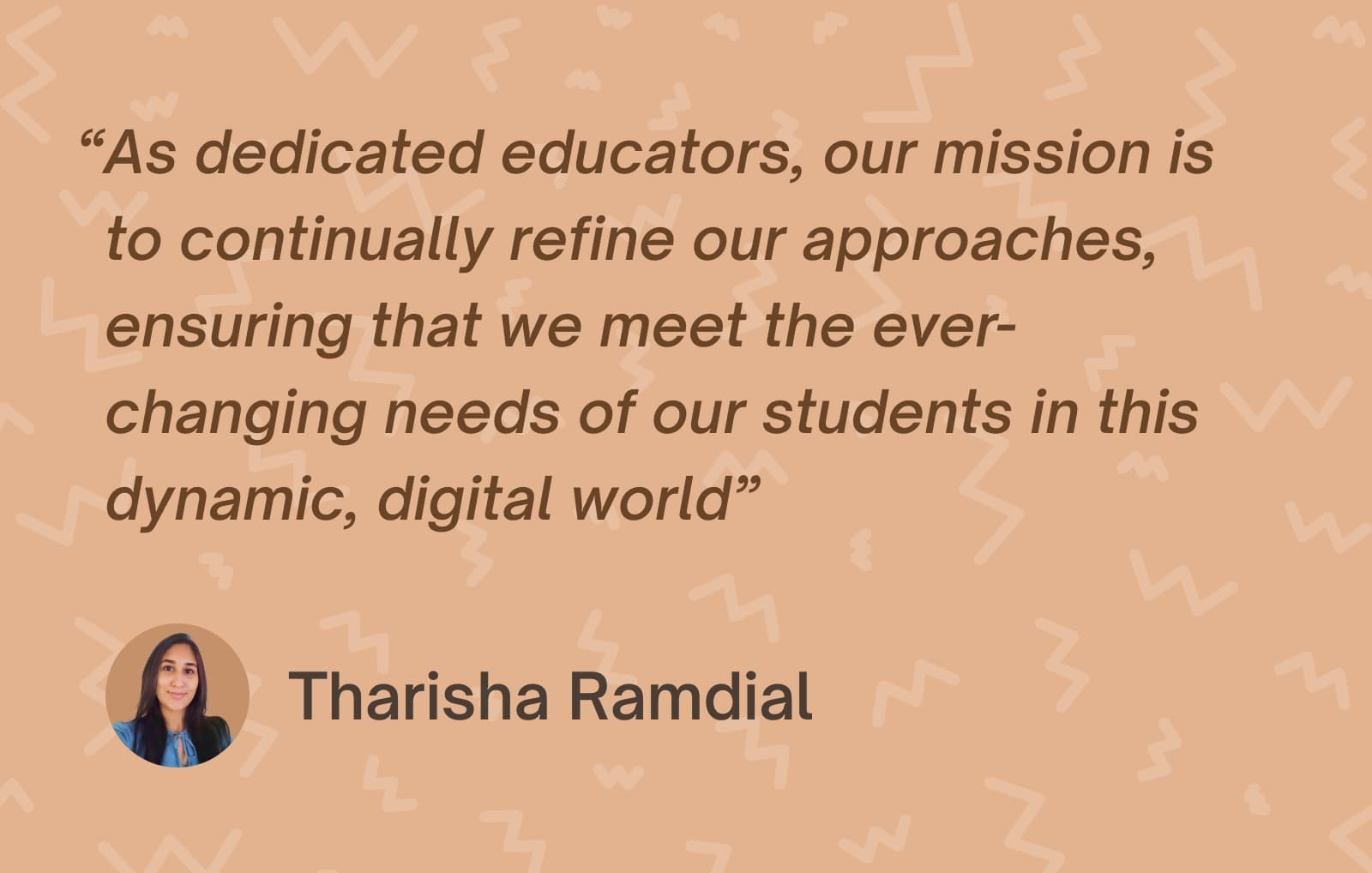Tutoring younger students and teens: From a tutor’s perspective

Empowering young minds is at the heart of every tutor's mission. Navigating the unique challenges and opportunities of younger students and teenagers requires a thoughtful approach tailored to their distinct developmental stages.
In this interview with Workee, Tharisha Ramdial, online tutor and founder of “Afrikaans Made Easy,” shares practical and realistic strategies for tutoring younger students and teens. From fostering emotional intelligence and harnessing the power of technology to promoting peer learning and building strong tutor-student relationships, this piece aims to equip tutors with the tools and insights necessary to empower the next generation of learners and help them reach their full potential.
Build a strong foundation: Establishing rapport and trust
By taking the time to understand their students' interests, passions, and aspirations, tutors can create a strong foundation for a successful and enjoyable tutoring experience, enabling students to feel secure and confident in their learning journey.

For instance, a tutor working with a young student who loves drawing could incorporate art-related activities into their lessons to spark interest and engagement. This could include illustrating vocabulary words, creating storyboards for narratives, or designing posters to demonstrate an understanding of a specific concept. The tutor establishes a deeper connection and fosters a positive learning environment by showing genuine interest in the student's passion for art.
When tutoring a teenager aspiring to become a scientist, a tutor could share their own experiences and knowledge related to the field and discuss current scientific discoveries and breakthroughs. This demonstrates genuine interest in the student's goals and creates a more relatable and inspiring learning experience.
Another example could be a tutor who openly shares their struggles and successes in learning a subject, helping to create an atmosphere of trust and understanding. This openness encourages students to be more honest about their challenges and allows for a more collaborative approach to overcoming obstacles.
Create a supportive environment: Understanding age-specific needs
Younger children often need additional structure, guidance, and motivation, while teenagers generally seek more autonomy and independence. Striking a balance between providing support and nurturing self-sufficiency is a delicate act a tutor must master. For instance, when working with younger students, a tutor may use a step-by-step approach to teach a new concept, such as breaking down the process of solving a math problem into smaller tasks. Frequent praise, such as verbal affirmation or sticker rewards, can help maintain their enthusiasm and confidence.

In contrast, it's essential to foster independent thinking and exploration when tutoring teenagers. A tutor might present a thought-provoking question or problem related to the subject and encourage the student to find their solution rather than provide a direct answer. Facilitating discussions that challenge the teen's critical thinking skills can be highly beneficial; for example, a literature tutor might encourage a debate about a character's motivations in a novel, prompting the student to analyze and support their viewpoint. Additionally, helping teens discover and pursue their interests within the subject matter can make learning more engaging and meaningful, ultimately fostering a sense of ownership and responsibility for their education.
Embrace technology: Engaging learners with digital tools
In today's digital age, young children and teenagers have become adept at using technology. Tutors can capitalize on this familiarity by incorporating digital tools into their lessons, making learning more engaging and relevant.

For younger children, a tutor might introduce an interactive whiteboard app that allows students to practice writing letters or numbers. Alternatively, they could use educational videos with lively animations and songs to teach new concepts fun and captivatingly.
For example, when teaching about animals and their habitats, a tutor could use an animated video series that explores different ecosystems, allowing students to visualize and better understand the subject. Online educational games that reinforce key skills, such as language or math, can keep younger students motivated and entertained while learning.
For teenagers, tutors can employ multimedia tools like video clips, podcasts, or interactive websites to spark interest and maintain focus. For instance, when teaching history, a tutor could use video documentaries or historical podcasts to supplement traditional textbook materials, creating a more immersive learning experience. Hands-on projects, such as creating a digital presentation or designing a website, can help teens apply their knowledge practically and engagingly. Furthermore, online social networks, like subject-specific forums or study groups, can allow teens to connect with their peers, share ideas, and collaborate on projects, fostering community and enhancing their learning experience.
Collaboration: Encouraging teamwork and peer learning
Younger students and teenagers benefit from different collaborative activities catering to their developmental needs and learning preferences. Providing opportunities for peer learning can help boost teamwork and communication skills while making the learning process more engaging.

A tutor could use pair work to help younger students solve puzzles or simple problems. They could also organize group activities like a hands-on science experiment where students switch roles, promoting social interaction and cooperative learning. A group storytelling exercise where each student contributes a sentence or idea promotes creativity and teamwork.
When working with teens, a tutor might organize a debate on a relevant or controversial topic, encouraging students to research and present their arguments. This promotes critical thinking, persuasion, and communication in students. A group project like designing a marketing campaign or making a short film requires students to collaborate and share their skills and perspectives.
Online discussion forums can be particularly helpful for both age groups, allowing students to share ideas, ask questions, and receive peer feedback. For younger students, a tutor could create a forum centered around a specific book or topic, guiding the conversation and ensuring a safe and supportive environment. For teenagers, a subject-specific forum or study group can facilitate more in-depth discussions and allow for greater autonomy in their learning.
Push and positivity: Employing age-appropriate motivational techniques
Younger students and teenagers have different motivators that drive their learning experiences. By tailoring motivational strategies to suit the age group they are working with, tutors can create a supportive and engaging learning environment that helps students stay focused, motivated, and invested in their education.

For instance, a tutor could use a sticker chart with younger students to track their progress in learning new vocabulary words or completing math exercises. The student might receive a small reward or treat upon reaching a specific goal.
This tangible recognition of their achievements can encourage younger learners to stay focused and maintain a positive attitude toward their studies. Additionally, verbal praise, like complimenting a student's effort or improvement, can boost their self-esteem and reinforce the value of hard work.
Teenagers, on the other hand, are often driven by a sense of accomplishment and intrinsic motivation. A tutor might highlight real-world applications of the subject, such as how understanding algebra can help manage personal finances or how learning a foreign language can open up new travel and career opportunities. By emphasizing the practical relevance of their learning, tutors can help teens see the value of their education beyond the classroom.
Another effective strategy for motivating teenagers is regularly highlighting their progress and growth. A tutor could provide constructive feedback that acknowledges improvements and identifies areas for further development.
For example, when reviewing a written assignment, a tutor might praise a teen's increased use of descriptive language while suggesting ways to improve their argument structure. This balanced feedback can foster a growth mindset and encourage teens to take ownership of their learning journey.
Empathy: Cultivating emotional intelligence and resilience
Young children and teenagers experience different emotional challenges. By addressing the varying emotional needs of young children and teens, tutors can create a nurturing and supportive learning environment that promotes emotional well-being and helps students navigate the challenges of their respective developmental stages.
For example, when working with younger students, a tutor could use picture books or stories to explore various emotions and feelings, prompting discussions about how characters might feel and why. They could also introduce activities encouraging emotional expressions, such as drawing pictures of different emotions or role-playing scenarios that allow children to practice empathy and understanding. A tutor might use emoji props or emotion cards to help young learners identify and communicate their feelings more effectively, fostering emotional intelligence and self-awareness.
On the other hand, teenagers often face many emotional and social pressures, such as academic stress, peer relationships, and self-identity issues. Tutors can support their emotional well-being by promoting self-reflection and mindfulness practices. For instance, they could encourage journaling as a means for teens to express their thoughts and feelings, providing an outlet for self-discovery and reflection.
Incorporating mindfulness techniques, like deep breathing exercises or guided meditation, can help teenagers manage stress and maintain focus during their tutoring sessions. A tutor could also introduce stress management strategies, such as time management tips, study breaks, or physical activity, to help teens cope with the challenges of adolescence more effectively.
Another way will be encouraging open discussions about challenges and emotions in a safe, non-judgmental environment. By sharing their own experiences and listening empathetically to the concerns of their students, tutors can create a supportive atmosphere that encourages emotional growth and resilience.
What advice do you have for younger and teenage tutors?

As a tutor for children and teens, it's crucial to customize teaching methods according to their distinct ways of thinking, behavior, and attitude. To cultivate a positive learning atmosphere, tutors should incorporate technology, promote teamwork, use age-appropriate encouragement, and develop emotional intelligence. Our primary goal as passionate educators is to consistently enhance our techniques to cater to the evolving requirements of our students in this fast-paced digital age.
Thank you, Tharisha, for sharing your insights and supporting Workee!
Connect and learn more about Tharisha's work on her Facebook and Instagram


